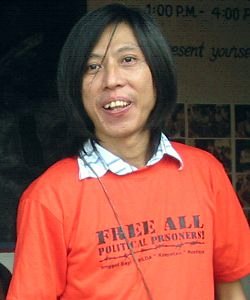DOJ dismisses
Ericson Acosta case
Poet demands freedom for all
political prisoners
By Free Ericson Acosta
Campaign
January 31, 2013
QUEZON CITY –
After almost two years, cultural worker Ericson Acosta is now free to
write poems and songs outside prison.
 The Department of Justice (DoJ)
today released a favorable resolution to Acosta’s Petition to have his
criminal case reviewed. His Petition for Review was filed at the DoJ
in September 2011.
The Department of Justice (DoJ)
today released a favorable resolution to Acosta’s Petition to have his
criminal case reviewed. His Petition for Review was filed at the DoJ
in September 2011.
Acosta was arrested in San
Jorge, Samar in February 13, 2011 on suspicion that he is a member of
the New People’s Army – just because he carried a laptop. He was
falsely charged with illegal possession of explosives at the Gandara
Regional Trial Court. Last January 17, the Gandara RTC granted Acosta
temporary release to undergo medical check-up, confinement and
treatment at the National Kidney Transplant Institute in Quezon City.
The Gandara RTC, Branch 41, granted the said motion on the same day.
Asked what he plans to do
soon after his release, Acosta said, “I would personally thank
everyone who campaigned for my release – my family, lawyers, friends,
former classmates and colleagues, fellow artists and human rights
advocates. Without their continuous support, authorities would not
have taken action on my case. There is an urgent need to continue the
struggle to free all political prisoners.”
Human rights group KARAPATAN
reported that there are now more than 400 political prisoners under
the Aquino administration. However, Malacanang, through its
spokesperson Edwin Lacierda, made a public statement that there are no
political prisoners in the Philippines.
“The unwarranted arrest and
torture torment political prisoners each day they remain in prison.
Political prisoners are rendered de facto ‘criminals’ and
‘terrorists,’ deprived of due process, forced to be at the mercy of
the military. This injustice has to end.” Acosta said.
Acosta’s Petition for Review
cited irregularities and human rights violations in the conduct of his
arrest and detention cited in the petition for review, namely, 1) he
was arrested without warrant while not committing any crime or doing
anything illegal; 2) he was not informed of the reason for his arrest
at the time of his arrest; 3) he was denied the right to counsel; 4)
he was denied a phone call and prevented from contacting his family or
lawyer; 5) he was subjected to prolonged interrogation for 44 hours;
6) he was physically and psychologically tortured during tactical
interrogation; 7) he was deprived of sleep, threatened, intimidated,
coerced and forced to admit membership in the NPA; 8) the grenade
subject of the case was planted; 9) the complaint against him was
filed in court only after 72 hours and 30 minutes; and, 10) he was
detained in a military camp, which is not of civilian jurisdiction.
The Free Ericson Acosta
Campaign rejoiced at the DoJ’s decision and held a short program
outside NKTI. The group said that a solidarity event is to be held in
the next few days in support of all political prisoners in the
country. The campaign to free Ericson Acosta has been sustained for
almost two years, gaining widespread local and international support
from prominent artist and human rights organizations such as the
Amnesty International, PEN International, Campaign for Human Rights in
the Philippines in the United Kingdom, Canada and New Zealand, INTAL-Belgium,
The International Conference for Progressive Culture-People’s Art
Network, BAYAN, SELDA, UP Diliman University Council, Concerned
Artists of the Philippines and even members and officials of the
state’s National Commission for Culture and the Arts (NCCA).
On November 2011, Acosta was
named finalist of the Imprisoned Artist Prize at the Freedom to Create
Awards Festival in Cape Town, South Africa, along with other nominees
from Myanmar and Tibet.
Acosta said, “In jail, I
yearned for sea and sky. Freedom cannot be achieved by mere yearning,
only by struggle.